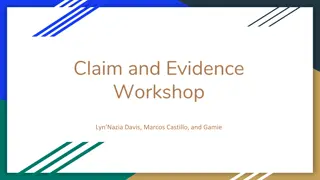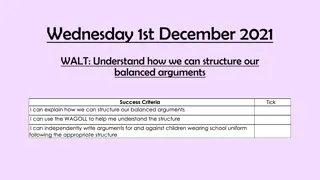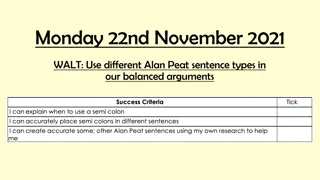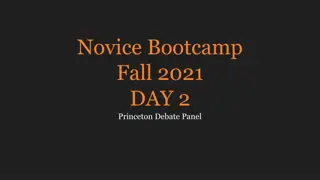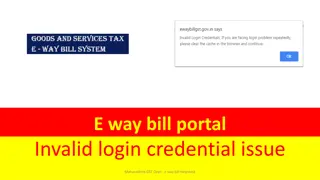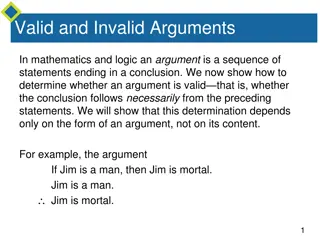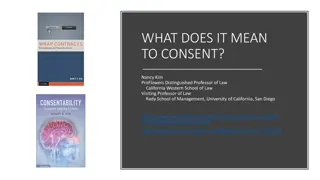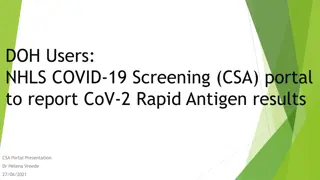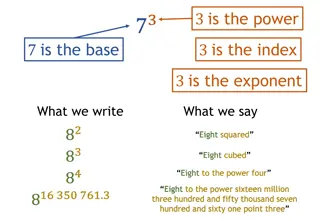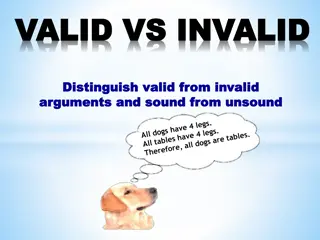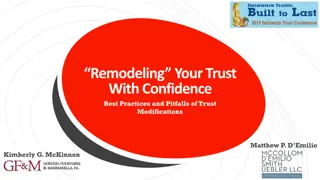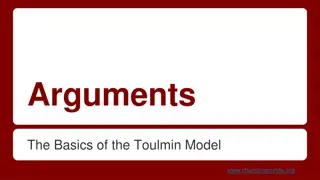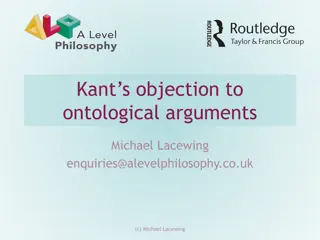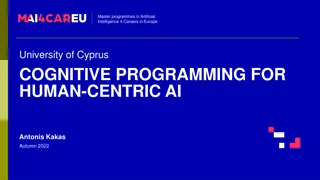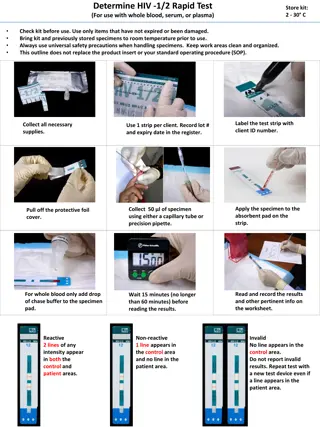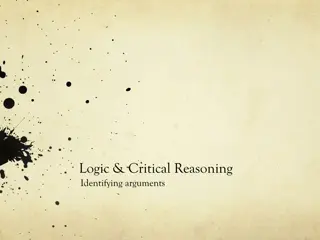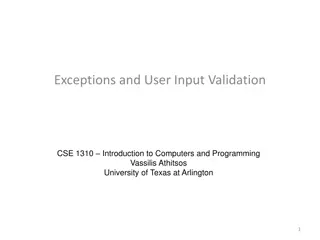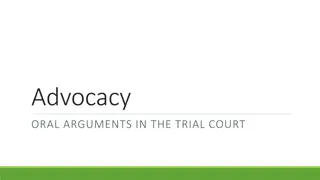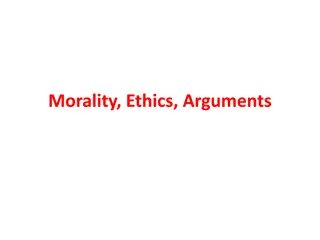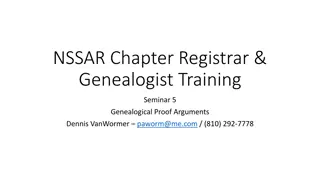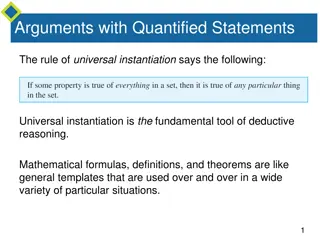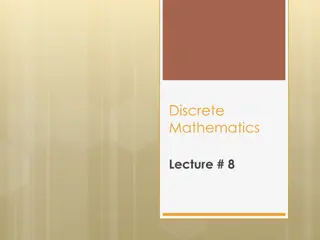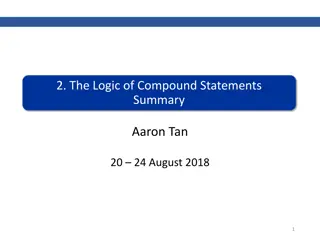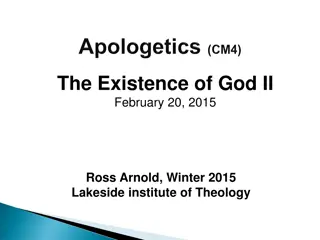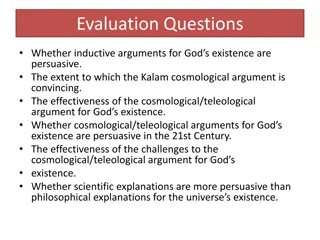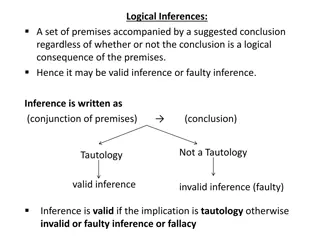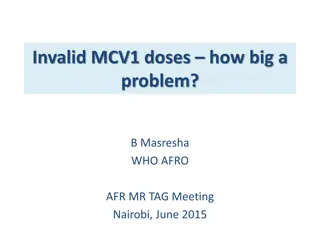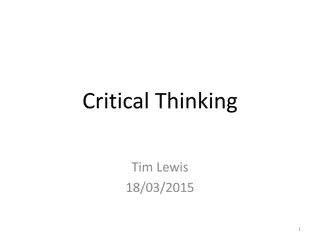What is PPC Fraud and How to Prevent It
Pay-per-click (PPC) advertising budgets are vulnerable to fraudulent clicks from bots, fake conversions, click farms and other invalid activity. Advertisers can suffer consequences like wasted ad expenditure, loss of leads, distorted analytics, and reduced campaign reach. Mitigate PPC fraud by monit
5 views • 3 slides
Understanding Logical Form and Equivalence in Conditional Statements
Delve into the intricacies of logical form, equivalence, and compound statements in the realm of propositional logic. Explore valid and invalid arguments, conditional statements, and the logic of compound statements with puzzles to sharpen your logical reasoning skills. Unravel scenarios like determ
2 views • 81 slides
Mastering the Toulmin Method for Constructing Persuasive Arguments
Learn how to effectively structure arguments using the Toulmin Method, which consists of Claim, Data, Warrant, Backing, Counterclaim, and Rebuttal elements. Explore reasoning and logic concepts, differentiate between inductive and deductive reasoning, and understand how to construct valid arguments
0 views • 30 slides
Understanding the Structure of Balanced Arguments
Explore the concept of using the third person in writing balanced arguments to maintain objectivity and structure. Learn about third person pronouns and the importance of being unbiased in your writing. Understand the significance of structuring your arguments and maintaining a clear order for effec
0 views • 11 slides
Mastering Alan Peat's Balanced Arguments with Different Sentence Types
Explore the use of various Alan Peat sentence types in crafting balanced arguments, focusing on incorporating semi-colons effectively. Engage in interactive activities and practice sessions to enhance your skills in creating compelling arguments. Dive into examples and exercises to refine your under
1 views • 12 slides
Mastering Debate: Essential Strategies and Techniques
Learn key concepts like argument structure, points of clarification, and how to make compelling arguments in a debate setting. Discover the importance of warrants, impacts, and implications in formulating strong arguments. Explore tips on coming up with effective arguments and understanding differen
0 views • 47 slides
Mastering Final Focus in Debates
Final Focus, a crucial 2-minute speech at the end of a debate, serves as your last chance to persuade the judge of your victory. It involves comparing key voters and emphasizing the impact of your arguments. Weighing key voters is essential, with a focus on demonstrating why the scale tips in your f
1 views • 4 slides
Troubleshooting Invalid Login Credential Issue on e-Way Bill Portal
Some users are encountering an "Invalid Login Credentials" error while trying to access the Maharashtra GST Department's e-Way Bill Helpdesk portal at ewaybillgst.gov.in. To resolve this issue, it is recommended to clear browser cache and cookies. Additionally, ensure you are using a recommended bro
0 views • 13 slides
Understanding Valid and Invalid Arguments in Mathematics and Logic
In mathematics and logic, determining the validity of an argument depends on its form rather than its content. An argument is considered valid if the conclusion necessarily follows from the premises. This determination involves analyzing the abstract form of the argument, constructing truth tables t
0 views • 32 slides
Understanding Consent: Legal and Moral Implications
Consent, as explored by Nancy S. Kim, involves a complex interplay of legal and moral consequences. This concept is context-dependent, relational, and incremental, with varying levels of autonomy interests at stake. Kim's work delves into the conditions, limits, and assessment of consent, shedding l
0 views • 38 slides
NHLS COVID-19 Screening Application Portal Guidelines
The NHLS COVID-19 Screening Application (CSA) portal is essential for reporting SARS-CoV-2 rapid antigen test results to the National Department of Health in South Africa. It is mandatory to report all rapid test results, including positive, negative, and invalid outcomes. Access to the CSA portal r
0 views • 14 slides
Understanding Reasonable Arguments vs. Pseudo-Arguments
The provided content focuses on distinguishing between reasonable arguments and pseudo-arguments through thought-provoking questions such as the ethical treatment of animals, city subsidies for sports venues, and subjective opinions on aesthetics. It also explains the structure of an argument, highl
0 views • 18 slides
RRM Enhancement for NR and MR-DC: PUCCH SCell Activation Requirements
In the electronic meeting of 3GPP TSG-RAN-WG4, the discussions focused on enhancing RRM for NR and MR-DC, specifically addressing PUCCH SCell activation/deactivation requirements. Points were made regarding the ending points of PUCCH SCell activation for both valid and invalid TA cases, beam informa
0 views • 15 slides
Budget Preparation 2021 Updates - March 12, 2020
Detailed updates and fixes for budget preparation in 2021, including cleanup tasks, HCM imports and exports, personal services updates, and grant management enhancements. The improvements address issues such as invalid funding, department codes, pay groups, job positions, funding distribution, and d
0 views • 20 slides
Numerical Expressions and Exponents Overview
This content covers various numerical expressions involving exponents, including examples of valid and invalid mathematical representations, matching worded expressions with their numerical equivalents, and identifying the correct expressions based on provided criteria.
0 views • 30 slides
Understanding Valid and Invalid Arguments in Logic
In logic, arguments consist of premises supporting a conclusion, with deductive arguments claiming logical necessity. Valid arguments have premises implying the conclusion, making them deductively valid. For example, if all actors are robots and Tom Cruise is an actor, then logically Tom Cruise must
0 views • 25 slides
An Examination of Ontological Arguments for God's Necessary Existence
Various ontological arguments, such as Malcolm's and Anselm's, propose that the existence of God is logically necessary, grounded in the concept of God as the greatest possible being. These arguments challenge the coherence of the concept of God and counter objections, like Kant's claim that existen
2 views • 10 slides
Trust Modifications: Best Practices and Pitfalls
Common law allows for modification of irrevocable trusts with consent from settlor and beneficiaries, but changes must align with trust purpose. Recent trends show more flexibility in trust modifications, with new statutory remedies and tools like decanting and nonjudicial settlement agreements. How
0 views • 19 slides
Understanding the Toulmin Model for Effective Argumentation
The Toulmin Model provides a structured approach to crafting and evaluating arguments, consisting of key components like claims, grounds/data, and warrants. It emphasizes the importance of using evidence and reasoning to support claims effectively. By understanding this model, one can enhance the pe
0 views • 13 slides
Kant's Critique of Ontological Arguments
An exploration of Kant's objection to ontological arguments, examining the flaws in the reasoning of Anselm and Descartes. Kant argues that existence is not a predicate and does not enhance the concept of a being. Therefore, ontological arguments cannot prove the existence of God solely through conc
0 views • 7 slides
Understanding Argumentation and Realization in AI Master Programmes
Exploring the concept of argumentation and its realization in artificial intelligence master programmes, focusing on the construction, evaluation, and implementation of arguments through cognitive programming. The framework involves structured argumentation, conflict relations, and strength/preferen
1 views • 31 slides
HIV Rapid Test Procedures and Instructions
This content provides detailed instructions for conducting HIV rapid tests using three different kits: Determine HIV-1/2 Rapid Test, Uni-Gold HIV-1/2 Rapid Test, and Bioline HIV-1/2 Rapid Test. The instructions include steps such as specimen collection, test device preparation, result interpretation
0 views • 5 slides
Understanding Logic and Critical Reasoning: Identifying Arguments
In the study of logic and critical reasoning, identifying arguments is a fundamental task. Arguments consist of premises supporting a conclusion, and they can be identified by specific indicators and techniques. Understanding argument structure and types of support, such as deductive and inductive,
2 views • 15 slides
Input Validation in Java Programming: Handling Exceptions and User Input
Learn how to implement input validation in Java programming to prevent crashes when users provide invalid input. Explore strategies for handling exceptions like InputMismatchException and the importance of reading strings directly from user input. Discover methods for converting strings to numbers a
1 views • 33 slides
Guide to Oral Arguments in Trial Court
Learn how to conduct oral arguments in a trial court, including the steps for both the movant and respondent, strategies for making strong arguments, and tips for responding effectively. This comprehensive guide covers the dos and don'ts of oral arguments, emphasizing the importance of preparation,
0 views • 9 slides
Supporters of Slavery in the 19th Century: Legal, Religious, and Economic Arguments
In the 19th century, defenders of slavery utilized legal arguments by denying citizenship rights to blacks, religious arguments by justifying ownership and guidance through biblical references, and economic arguments by comparing treatment of slaves in the South to conditions of workers in the North
0 views • 4 slides
Understanding Command-line Arguments and Errors
Learn how to utilize command-line arguments in Python scripts to enhance flexibility and parametrize functions for various inputs. Explore ways to access and utilize command-line arguments effectively, while handling errors gracefully.
0 views • 30 slides
Understanding Morality, Ethics, and Arguments in Philosophy
Morality and ethics are interconnected concepts that delve into the principles of right and wrong conduct. They involve disciplined reflection on human moral intuitions and choices. Valid and invalid moral arguments exemplify the importance of drawing evaluative conclusions from facts. Various ethic
0 views • 9 slides
Analyzing Arguments in English Debates: A Critical Approach
Explore and critique various arguments presented in English debates, including topics like dietary recommendations, digestion issues with Japanese rice, and driving skills in different weather conditions. Learn how to evaluate evidence, causality, and persuasiveness in arguments to develop critical
0 views • 19 slides
Mastering Academic Writing Moves: The Art of Summarizing
In academic writing, mastering the art of summarizing is crucial for persuasive arguments. By engaging in dialogue with others and summarizing their arguments, writers can strengthen their position. It is important to strike a balance between the original author's ideas and your own, emphasizing asp
0 views • 15 slides
An Overview of Debate: Propositions, Teams, and Formats
Debate is a regulated discussion between two matched sides discussing a proposition, with the affirmative arguing for change and the negative defending the status quo. The standard debate format involves constructive arguments followed by rebuttals from both sides. The roles in a debate include the
0 views • 47 slides
Genealogical Proof Arguments and SAR Standard of Proof
This detailed content covers the definitions and components of genealogical proof arguments, proof summaries, and the SAR standard of proof. It explains the importance of evidence quality, source citations, and analysis in establishing acceptable genealogical conclusions for SAR membership applicati
0 views • 22 slides
Understanding Universal Instantiation in Deductive Reasoning
Universal instantiation is a crucial tool in deductive reasoning, allowing us to derive specific conclusions from general statements. By combining universal instantiation with modus ponens and modus tollens, we can construct valid arguments such as universal modus ponens and universal modus tollens.
0 views • 13 slides
Understanding Valid and Invalid Arguments in Discrete Mathematics
Concepts of valid and invalid arguments in discrete mathematics are explored through examples. Learn how to determine the validity of arguments based on premises and conclusions. Practice using truth tables to evaluate argument forms. Enhance your logical reasoning skills in Discrete Mathematics.
0 views • 22 slides
Understanding Compound Statements in Logic
The summary discusses the logic of compound statements, covering logical form, equivalence, tautologies, contradictions, conditional statements, valid and invalid arguments, and more. It explains the definitions of statements, negation, conjunction, disjunction, statement form, logical equivalence,
0 views • 12 slides
Philosophical Apologetics: Arguments for the Existence of God
Philosophical apologetics presents various arguments for the existence of God, including the ontological, cosmological, teleological, moral, transcendental, and presuppositional arguments. These arguments cover diverse aspects such as change, causality, design, contingency, miracles, consciousness,
0 views • 10 slides
Evaluating Arguments for God's Existence in the 21st Century
Exploring the persuasiveness of inductive arguments for God's existence, assessing the Kalam cosmological argument, and evaluating the effectiveness of cosmological/teleological arguments. Delving into whether scientific explanations surpass philosophical ones, the strengths and weaknesses of these
0 views • 16 slides
Understanding Logical Inferences and Rules of Inference
Logical inferences involve drawing conclusions from premises, which can either be valid or invalid based on the rules of inference. This includes Modus Ponens, Hypothetical Syllogism, DeMorgan's Law, and Law of Contrapositive. Invalid inferences result in fallacies like denying the antecedent. Exerc
0 views • 18 slides
Analysis of Invalid MCV1 Doses: A Critical Review
The analysis delves into the issue of invalid MCV1 doses in African countries, highlighting delayed vaccination schedules, policy inconsistencies, and the impact on vaccine response. Findings reveal a substantial proportion of children receiving vaccines outside recommended guidelines, necessitating
0 views • 22 slides
Understanding Critical Thinking, Hypotheses, and Arguments
Explore the concepts of critical thinking, hypotheses, and arguments in this informative content. Learn about the definition of hypotheses, the nature of arguments, and syllogisms. Delve into the world of logical reasoning and the foundations of thought processes.
0 views • 32 slides


